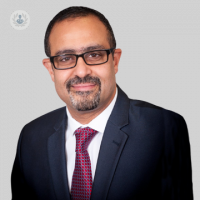Tummy tucks: Are they worth it?
Written by:The improvement that tummy tucks can offer doesn’t just stop at aesthetics, but they can relieve health issues, too.
Leading consultant plastic surgeon Mr Haitham Khashaba discusses exactly why a tummy tuck is worth it, whilst addressing questions about the procedure, how long it lasts and other popular queries about this topic.

What are the advantages of a getting a tummy tuck?
As a plastic surgeon, I would recommend a tummy tuck, also known as abdominoplasty, for patients who have excess skin and fat in the abdominal area that cannot be addressed through diet and exercise alone. This procedure can also be beneficial for patients who have experienced significant weight loss or have loose abdominal muscles due to pregnancy or ageing.
A tummy tuck can provide a more toned and contoured appearance to the abdomen by removing excess skin and fat and tightening the underlying muscles. This can improve the patient's self-confidence and quality of life, as well as address medical issues such as skin irritation or infection caused by excess skin folds.
It's important to note that a tummy tuck is not a weight loss solution, and patients should be at or near their ideal weight before undergoing the procedure. Additionally, patients should have realistic expectations about the results and be committed to maintaining a healthy lifestyle to ensure long-term success.
What does a tummy tuck do?
During the procedure, I would remove the excess skin and fat from the abdomen, and may be tighten the underlying muscles, and reposition the belly button to create a more contoured and toned appearance. This can not only enhance your physical appearance but also improve your confidence and self-esteem.
It's important to note that a tummy tuck is a major surgery and should not be taken lightly. As with any surgical procedure, there are risks and potential complications, and it's essential to have a thorough consultation with a board-certified plastic surgeon to determine if it's the right choice for you.
How long does a tummy tuck last?
The results of a tummy tuck can last for many years, but the longevity of the procedure will depend on various factors such as your age, lifestyle habits, and the extent of your surgery. A tummy tuck can provide long-lasting results, particularly if you maintain a healthy diet and exercise regularly.
It's important to note that a tummy tuck is not a permanent solution, and the effects of aging, weight fluctuations, and pregnancy can impact the appearance of your abdomen over time. However, many patients are able to enjoy the benefits of a tummy tuck for a decade or more before considering additional procedures.
To help prolong the results of your tummy tuck, it's essential to maintain a healthy weight and lifestyle habits. This includes following a nutritious diet, engaging in regular exercise, and avoiding smoking and excessive alcohol consumption. These habits can help to keep your body in good health and reduce the risk of weight fluctuations or other factors that could impact the longevity of your tummy tuck results.
As a plastic surgeon, I always emphasise the importance of having realistic expectations and understanding that a tummy tuck is a surgical procedure that involves some risks and recovery time. By working closely with your surgeon and following their post-operative instructions, you can help to ensure the best possible results and a long-lasting outcome.
What are the disadvantages of a tummy tuck?
As with any surgical procedure, there are potential risks and disadvantages associated with a tummy tuck.
These can include:
- Scarring: A tummy tuck involves making an incision across the lower abdomen, which can result in a visible scar. While the scar will fade over time, it may be permanent and could be more noticeable in some patients.
- Pain and discomfort: A tummy tuck is a major surgical procedure that can be painful and uncomfortable during the recovery period. Patients may experience swelling, bruising, and discomfort for several weeks after the procedure.
- Risks of anaesthesia: General anaesthesia is typically used during a tummy tuck, which carries some risks such as allergic reactions or complications related to pre-existing medical conditions.
- Infection: Any surgical procedure carries a risk of infection, and patients may need to take antibiotics to prevent or treat an infection after a tummy tuck.
- Blood clots: Surgery and a period of decreased activity can increase the risk of blood clots, which can be potentially life-threatening.
- Unsatisfactory results: While a tummy tuck can improve the appearance of the abdomen, the results may not meet the patient's expectations, or there may be unevenness or asymmetry.
It's important for patients to understand the potential risks and disadvantages of a tummy tuck before deciding to undergo the procedure. As a plastic surgeon, I would carefully evaluate your medical history, lifestyle factors, and aesthetic goals to determine whether a tummy tuck is the right option for you and to minimise the risks of complications.
Is the tummy tuck painful? How long does it take?
A tummy tuck is a major surgical procedure that involves making an incision across the lower abdomen, removing excess skin and fat, and possibly tightening the underlying muscles if required. While the procedure is performed under general anaesthesia, patients can expect to experience some pain and discomfort during the recovery period.
After the procedure, patients may experience swelling, bruising, and tenderness in the treated area. Pain medication and other treatments can help to manage discomfort during this time. It's important to follow your surgeon's instructions for post-operative care, including taking prescribed pain medication as directed and avoiding strenuous activity until cleared by your surgeon.
The length of the tummy tuck procedure can vary depending on the extent of the surgery and other factors. In general, a tummy tuck can take between two and four hours to complete, and patients may need to stay in the hospital overnight for observation and monitoring.
The recovery period after a tummy tuck can take several weeks to several months, depending on the individual and the extent of the surgery. Patients should plan on taking at least two weeks off work and avoiding strenuous activity for several weeks after the procedure. It's important to follow your surgeon's instructions for post-operative care and attend all scheduled follow-up appointments to ensure the best possible outcome and minimise the risk of complications.
How much does a tummy tuck cost?
The cost of a tummy tuck can vary widely depending on various factors such as the surgeon's experience, geographic location, the extent of the procedure, concomitant procedures (such as liposuction or tightening your abdominal muscles), and other related expenses. In the UK, the average cost of a tummy tuck is around £7,500 to £12,000.
When considering the cost of a tummy tuck, it's essential to do your research and choose a certified plastic surgeon with extensive experience in performing the procedure. While cost is an important factor to consider, it should not be the only factor. It's also important to prioritise your safety and the quality of care you receive to ensure the best possible outcome.
During a consultation with a plastic surgeon, they will be able to provide a more accurate estimate of the cost of a tummy tuck based on your specific needs and goals.
If you’re considering a tummy tuck and would like to arrange a consultation with Mr Khashaba to discuss the issue further, arrange a consultation with him via his Top Doctors profile.


